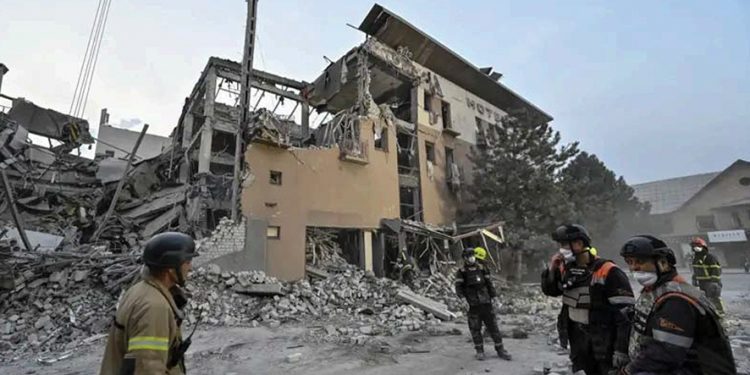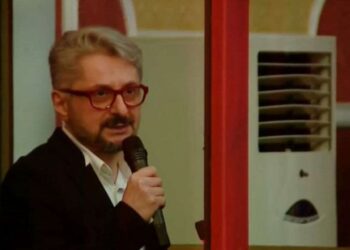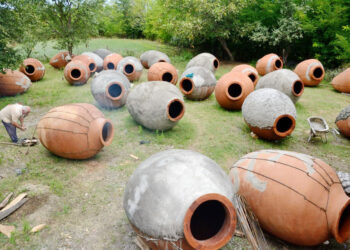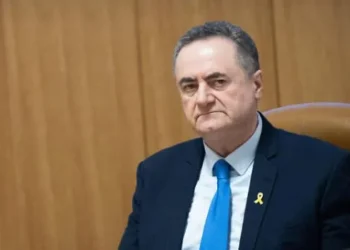Russia on Monday launched one of its most significant air attacks on Ukraine to date, according to Mykola Oleshchuk, the commander of Ukraine’s air force. The assault began overnight on Monday and continued into Tuesday, with Russia firing 127 missiles and 109 attack drones. Ukraine managed to shoot down 102 missiles and 99 drones, Oleshchuk reported on Telegram.
The attack targeted more than half of Ukraine’s regions, causing widespread blackouts by hitting power infrastructure. The entire country was placed on an air raid alert and citizens were advised to seek shelter. At least ten people were killed and dozens were wounded.
Ukrainian air defenses shot down around 15 drones and several missiles near Kyiv alone during the attack, the head of the city’s military administration says.
“Everything that flew to the capital of Ukraine was destroyed,” Serhiy Popko wrote on Telegram.
Later in the day, a Russian missile struck a civilian infrastructure building in Kryvyi Rih, an eastern city, resulting in one woman’s death and leaving five others presumed missing, according to local military administration head Oleksandr Vilkul.
Russia confirmed it had targeted Ukraine’s energy infrastructure—a long-standing tactic—and claimed all its objectives were achieved. The barrage of missiles and drones was described by Oleshchuk as “the most massive aerial attack.”
In a related incident, Poland reported that an “object” entered its territory during the attack. Army spokesman Jacek Goryszewski indicated that it was likely a drone, given the object’s trajectory and speed, as quoted by Reuters.
NATO spokesperson Farah Dakhlallah condemned the attacks, stating that breaches of NATO airspace by Russia were “irresponsible and potentially dangerous.”
Previously, a December attack, which involved 158 missiles and drones, was considered the largest. However, Monday’s strikes were intended not only to disrupt Ukraine’s energy supply, but also to undermine Ukrainian morale. This comes as Ukrainians were buoyed by recent successful incursions into Russian territory in the Kursk region.
Russia’s message with this latest assault was clear: despite recent Ukrainian successes, Moscow can still inflict significant suffering on the Ukrainian population and remind Western capitals of its enduring military capability.
“We will undoubtedly respond to Russia for this and all other attacks. Crimes against humanity cannot go unpunished,” President Volodymyr Zelensky responded in a post on social media.
US President Joe Biden was also among those who condemned Russia’s strikes on Ukraine.
“I condemn, in the strongest possible terms, Russia’s continued war against Ukraine and its efforts to plunge the Ukrainian people into darkness,” Biden said in a post on X. “Russia will never succeed in Ukraine, and the spirit of the Ukrainian people will never be broken.”
NATO Secretary General Jens Stoltenberg also voiced support.
“In the wake of the latest Russian assault, allies today reaffirmed they are stepping up their military aid to Ukraine,” he said. “We must continue to provide Ukraine with the equipment and munitions it needs to defend itself against Russia’s invasion. This is vital for Ukraine’s ability to stay in the fight.”
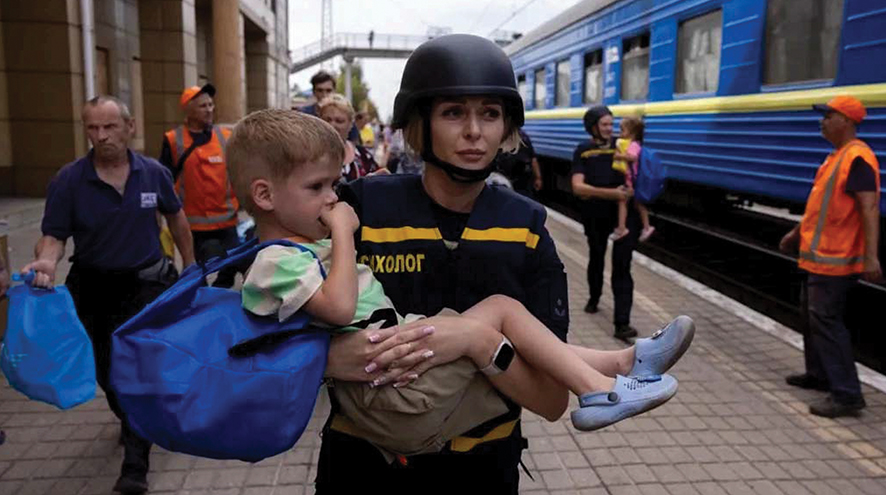
Zelensky Pleas for Increased Western Support Following Latest Russian Strikes
President Volodymyr Zelensky has used the latest deadly Russian barrage to underscore the urgent need for greater Western support for Ukraine.
Zelensky is calling for two main forms of support. First, he urges British, American, and other Western partners to grant permission for Ukraine to use long-range Western-made weapons that would enable strikes on ammunition stores, planes, and airfields deeper inside Russia, which Zelensky believes would mitigate Moscow’s ability to terrorize Ukrainian cities.
Second, he emphasizes the need for a more coordinated effort to counter the Russian missiles and drones that are targeting civilians and damaging Ukrainian energy infrastructure. He pointed to the example of Israel, which received substantial aid to intercept the majority of a massive Iranian and proxy missile barrage in April, as a model for how Ukraine could be better supported.
Russia: Ceasefire Negotiations No Longer Relevant
A Russian government spokesman has stated that ceasefire negotiations with Ukraine are no longer under consideration. Kremlin spokesperson Dmitry Peskov told reporters that the “topic of negotiations with Ukraine has pretty much lost its relevance.”
Peskov also indicated that Russia is responding to Ukraine’s recent incursion into the Kursk region.
Ukraine in Russia’s Kursk Region
Ukraine launched its cross-border attack into the Kursk region on August 6, and since then, has claimed control over more than 1,000 square kilometers of Russian land.
Approximately 10,000 elite Ukrainian troops breached the poorly defended border, seizing more ground in a few days than Russia has gained in Ukraine this year. As the fighting has intensified, tens of thousands of Russian civilians have been evacuated.
President Zelensky stated that the Kursk operation aimed to capture Russian soldiers, leading to a prisoner swap on Saturday – in exchange for 115 Ukrainians, the same number of Russians were released.
Zelensky also described the operation as a preventative measure to deter Russian attacks on Ukraine’s bordering Sumy region. He also mentioned there are other undisclosed objectives associated with the operation, and said it is part of a “victory plan” that he will present to US President Joe Biden next month and will show to both US presidential candidates, Kamala Harris and Donald Trump.
Ukrainian drones hit oil depots in Russia’s Rostov, Kirov oblasts
On August 28, Ukrainian drones operated by military intelligence struck oil depots in Russia’s Rostov and Kirov oblasts. The attack on Kirov Oblast, approximately 1,200 kilometers from the Ukraine border, resulted in a fire at two oil tanks. Russian air defenses shot down two drones, while claiming that three others had “crashed” near the Zenit oil facility in Kotelnich, causing a fire. No casualties or significant damages were reported, according to Kirov Oblast Governor Alexander Sokolov.
“The Zenit oil depot is a facility of the enemy military-industrial complex and provides fuel to the Russian occupation forces,” a source told the BBC.
Situation in Pokrovsk “Tense”
The situation in Pokrovsk, a key mining city in eastern Ukraine’s Donetsk region, is increasingly tense as Russia advances towards it. Moscow views capturing Pokrovsk as crucial for annexing the entire Donbas region. President Zelensky has described the situation near Pokrovsk as “difficult” amid preparations for a potential Russian offensive.
‘Your freedom is our freedom, says von der Leyen
In a video message celebrating Ukrainian Independence Day on August 24, European Commission President Ursula von der Leyen declared, “Your freedom is our freedom, your security is our security.”
She emphasized that Europe will always stand by Ukraine because, as she put it, “Ukraine is Europe.” Von der Leyen also highlighted the rapid progress Ukraine is making toward joining the European Union.
“The EU has been with Ukraine from day one, and we will continue to stand by you for as long as it takes,” she assured.
The day before Ukrainian National Day, a 30-meter Ukrainian flag was displayed on the esplanade of the European Parliament in Brussels. The flag was subsequently raised in front of the Berlaymont, the headquarters of the European Commission, which was illuminated in blue and yellow.
War ‘Getting Closer’ for the Russian Public
Nina Krushcheva, a professor of International Affairs at The New School in New York City, spoke to the BBC’s Radio 4 from Moscow, giving insight on how Russians on the ground are being increasingly impacted by the war, particularly in Kursk following the Ukrainian incursion. She pointed out that “the goods are fewer, the prices are higher, and there is much more military rhetoric coming out of everywhere.”
Regarding President Putin, Krushcheva described him as “slightly frozen” since the Ukrainian incursion. She recalled an early appearance he made after the incursion, where he was seen reading from “little pieces of paper,” which was atypical for him. Krushcheva noted that Putin’s difficulty in pronouncing the words was unusual, given his reputation as a skilled speaker, making the situation “a bit confusing.”
She also mentioned that Putin has been known to take time to formulate his responses when faced with unexpected developments.
Steve Rosenberg, the BBC’s Russia Editor, in a video report noted that “No one anticipated that Russia’s border would be breached. There’s a palpable sense of fatigue, and the prevailing sentiment is a desire for peace. Yet, there is no unified perspective on how to achieve it.”
He reports that some Russians echo the state media’s call for “peace on Russia’s terms,” essentially demanding Ukraine’s complete surrender. Others, he says, hope for negotiations between Moscow and Kyiv to find a resolution to the conflict.
Officially, the Kremlin continues to refer to its actions in Ukraine as a “special military operation” and describes the current activities in the Kursk region as a “counter-terrorism operation.” Yet, for many ordinary Russians, the situation is simply referred to as “war.”

India ready to help find peace, Modi tells Ukraine
Indian Prime Minister Narendra Modi made a historic visit to Ukraine last week, telling President Volodymyr Zelensky that he is ready to take a personal role in seeking peace. Modi’s visit follows a period of tension, as Zelensky had previously criticized him for hugging Russian President Vladimir Putin during a trip to Moscow on a day when Russian strikes, including one on Kyiv’s largest children’s hospital, resulted in over 40 deaths.
Modi’s first stop was Ukraine’s history museum, where he viewed an exhibition commemorating the 570 Ukrainian children reported killed since Russia’s full-scale invasion began in February 2022. Both leaders participated in placing soft toys at a makeshift shrine, with Modi later expressing his grief over the “martyred” children.
Modi posted an image on social media of himself with his arm around Zelensky, accompanied by a message expressing condolences to the families of the deceased children. He also offered to facilitate peace talks, underscoring that only dialogue and diplomacy could end the conflict.
Despite Modi’s assurances of support, India has not condemned Russia’s invasion and continues to bolster Moscow’s war economy, recently surpassing China as the largest importer of Russian oil amid Western sanctions. During their discussions, Modi and Zelensky addressed Ukraine’s ongoing military actions in Russian territory, though specifics of the conversation remain undisclosed.
India participated in a Ukraine-led peace summit in Switzerland in June, where Russia was excluded. Zelensky invited Modi to endorse a joint communique emphasizing Ukraine’s territorial integrity, which Modi later echoed. Both leaders released a joint statement pledging to enhance defense and trade relations between their countries, marking the visit as a significant moment in their diplomatic relations.
Heritage Under Attack: Ukrainians Revive Interest in Culture
The Russian invasion has severely damaged Ukraine’s cultural heritage, with 432 sites hit since February 2022, including 139 religious sites and 31 museums. The Hryhoriy Skovoroda National Literary Memorial Museum, hit by a missile in May 2022, saw only the philosopher’s statue survive. This destruction, alongside Russian theft and repurposing of Ukrainian cultural artifacts, has intensified a national cultural revival.
Despite the loss, Ukrainians are increasingly valuing their cultural heritage. The destruction has sparked a “Ukrainian cultural boom,” with new plays, performances, and renewed interest in cultural traditions. The head of UNESCO’s Ukraine desk, Chiara Dezzi Bardeschi, told the BBC that culture is crucial for community resilience and healing.
“What I’ve seen is communities really asking for culture and their cultural centres. They recognize its importance for the community and they need it for their resilience. Culture is very important for healing trauma,” she said.
Indeed, volunteers have played a crucial role in this, providing not just essential supplies but also musical instruments. UK-based musician Irina Gould, in conversation with the BBC, noted that music offers children emotional relief, transporting them away from the sounds of war and into a world of beauty and happiness.
Ukrainian Acting Culture Minister Rostyslav Karandeyev has accused Russia of targeting symbols of Ukrainian identity.
The cultural resurgence offers a beacon of hope and unity amidst the devastation.
Source: The BBC
Compiled by Team GT

